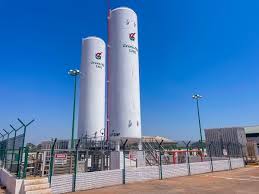The Minister of State for Petroleum Resources (Gas), Ekperikpe Ekpo, has officially commissioned Nigeria’s first Liquefied to Compressed Natural Gas (LCNG) hub in Yola, Adamawa State. The project, developed by Greenville LNG, marks a major milestone in the Federal Government’s effort to promote gas usage across the country under its “Decade of Gas” initiative.
Speaking during the inauguration on Tuesday, Ekperikpe Ekpo praised the public-private collaboration that led to the establishment of the LCNG hub. He said the project is a strong example of how partnerships between government and the private sector can help unlock Nigeria’s natural gas potential for national development.
According to a statement released by his media aide, Louis Ibah, the minister explained that the location of the project in North-East Nigeria was highly strategic and symbolic. He pointed out that the North-East region has suffered years of infrastructural neglect and security challenges, which have slowed down its economic growth.
He said, “This facility in Yola marks a significant turning point. It is a beacon of hope and opportunity, not only for Adamawa State but for the entire region. It shows that the benefits of Nigeria’s gas reserves can and must reach every corner of the country.”
Ekpo noted that President Bola Ahmed Tinubu has made it a national priority to use Nigeria’s large gas resources to transform the economy, boost industrialisation, and improve the living standards of citizens. He described the LCNG project as a good example of innovation in energy solutions, offering both LNG and CNG as alternative fuels for vehicles and industrial machines.
He stressed that gas is not only a cleaner source of energy than diesel and petrol, but also a cheaper one, which makes it ideal for both commercial and domestic use. “This transformative project highlights the Federal Government’s unrelenting efforts to drive economic growth through gas adoption. Natural gas has huge potential to support energy security and development,” he added.
The minister also used the opportunity to invite more investors and gas developers to explore opportunities in the LCNG space. He said more communities still lack access to affordable energy and called on stakeholders to help expand the reach of such projects.
Ekpo thanked the Adamawa State Government and the local communities for their cooperation in making the project a reality. He appreciated the provision of land and support during construction, which he said contributed to the successful completion of the hub.
“President Tinubu truly means well for the people of Adamawa. That is why this administration is committed to ensuring that the state enjoys the full benefits of natural gas,” he said.
Adamawa State Governor, Ahmadu Umaru Fintiri, was represented at the event by his deputy, Professor Kaletapwa Farauta. She expressed gratitude to the Federal Government for facilitating the LCNG investment in the state and said it was in line with the state’s goal of promoting cleaner and more affordable energy sources.
Farauta noted that Adamawa has been directly affected by the harsh effects of climate change, making it even more important to adopt cleaner energy. She assured that the state would support every policy and project aimed at protecting the environment and improving public health.
“We are committed to doing our part to ensure the success of this project, and we hope to see more Federal Government interventions in this area,” she said.
Also speaking at the event, the Chairman of Greenville LNG, Mr Eddy Van Den Broeke, said the company has committed over $1 billion to energy infrastructure projects across Nigeria. He confirmed that similar LCNG facilities will be developed in other states in the near future.
He appealed for continued support from both the federal and state governments, saying such cooperation is essential to ensure the success and expansion of gas infrastructure projects.
The Yola LCNG hub is expected to provide a reliable and cost-effective energy solution for vehicles, industries, and small businesses in the North-East. It is also seen as an important step in bridging the energy gap in underserved areas of the country.
